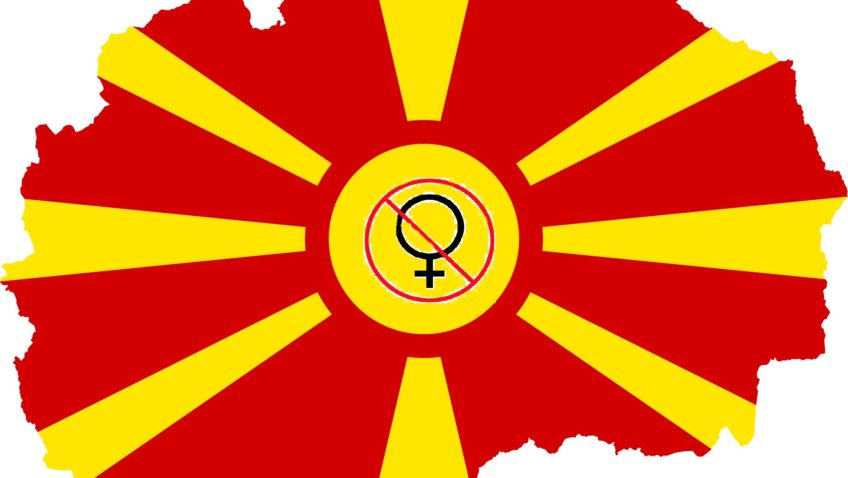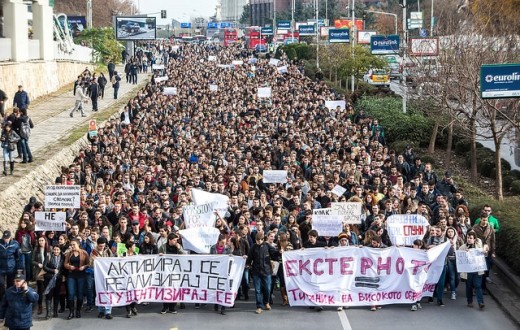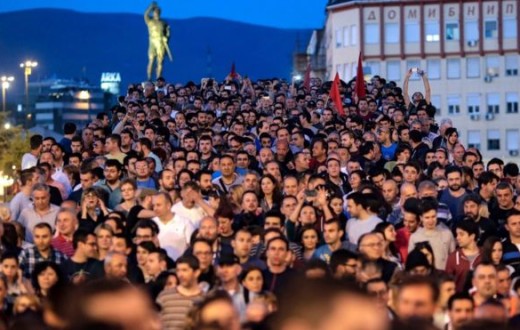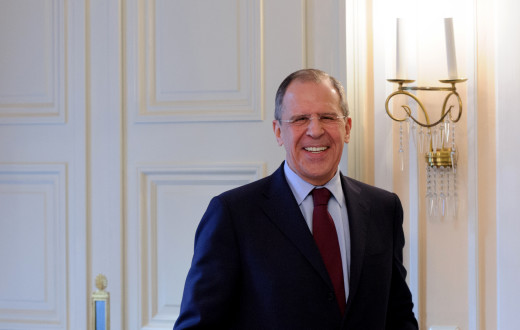If you encountered posters for the local election campaign in Macedonia, you might get the idea that “Life is coming to Macedonia for everyone” (SDSM’s election slogan since the 2016 parliamentary elections), or that “A new era is approaching” (VMRO – DPMNE’s slogan for the local elections). What the slogans of the two main political parties in the country forgot to mention was that if you’re a woman striving for a career in politics, you probably would have to wait for an even ‘newer‘ era, since there is hardly ‘life‘ for women in Macedonian politics.
This rule does not exclude the ethnic Albanian parties – BESA’s “renaissance now” slogan probably referred to the renaissance humanism which put man in the center, as BESA, nominated only one woman out of 20 mayoral candidates. Nafie Selmani was BESA’s mayoral candidate for the city of Skopje, a position which in the predominantly ethnic Macedonian capital is by definition out of BESA’s reach. The Democratic Union for Integration – (DUI) party slogan “together for the municipality”, didn’t foresee integration of women in their own party lines, with the exception of Teuta Arifi, the only woman candidate among the 18 mayoral candidates, which makes ’togetherness for municipalities’ a very vague term. The Alliance for Albanians was even more symbolic with their slogan, implying that no Albanian woman has the “wisdom and courage” to enter their exclusive club of 11 men running for mayor.
Women mayors – a needle in a haystack?
Overall, only 16 women ran in the local elections this October. Two were independent candidates, leaving only 14 women overall nominated by parties for the 81 mayoral positions. Out of the 261 mayoral candidates, in 2017 women amounted to 6%. In the local elections in 2013, even though there were 29 women running for mayor, the greater number of candidates (323) made the percentage of women insignificantly higher than this year’s percentage. Whereas in 2013 there were four women elected as mayors, it is even more disappointing to note that the 2009 elections did not bring a single mayoral position to any of the 13 women mayoral candidates (which was in any case a remarkably low at 3.6% of all candidates). If you are looking for a well packed quixotic optimism, you are probably going to interpret this year’s six women mayors as a 50% increase in women mayors in a society. If you are a down-to-Earth person who is not taking mood supplements, you are going to interpret the situation as highly problematic.
This year’s first round of local elections was won by two women, both of them nominated by the governing SDSM, in the municipalities of Aracinovo and Bitola. Another five women faced a runoff on October 29 and ultimately four of them were elected. With the exception of Tetovo (the fourth largest city in Macedonia) and Bitola (the third largest city in Macedonia), out of Staro Nagorichane, Makedonska Kamenitsa, Aracinovo and Mogila, only Aracinovo barely surpasses a population of 10,000. Five of these elected women were nominated by SDSM, and one, Mrs. Arifi, was openly supported by them in Tetovo, where SDSM didn’t even nominate its own candidate. The fact that all these women were nominated or supported by SDSM, which ended up absolutely victorious in this election by winning 57 out of the 80 municipalities* , together with the city of Skopje, does not prove an increasing readiness of the society in Macedonia for more women in politics.
According to a poll conducted in March 2017 by IRI, less than 20% of the respondents claimed they were ready to vote for a candidate as an individual, and not for the party that nominates the candidate. Interestingly, according to the same poll, more than 70% of the respondents stated that the it makes no difference to them if the candidate was a man or a woman, which holds the parties which do not nominate women for mayoral positions fully accountable for the underrepresentation of women in mayoral positions.
Macedonia, with its six women mayors is a far cry from the impression one gets after reading that Macedonia is a leader in the Balkans when it comes to women in politics (regarding only MPs). In the mayoral seat in Sofia, Bulgaria’s capital with a population of almost 1.7 million, sits a woman, and women mayors total 26% in neighboring Serbia.
State Election Commission – supporting patriarchy at the local level?
Even though a gender quota has been introduced to increase the representation of women councilors in local municipalities, requiring that each gender be represented with at least 40%, only 15 out of the 81 municipalities in Macedonia number 40% or more women councilors. In the remaining municipalities the representation of women is very low. Whereas there are municipalities where the share of women councilors varies between 30% and 40%, there are still cases where they do not even add up to a fourth of the councilors. In 31 municipalities women make up to 26% at best, in some cases 18% or less and in one municipality even less than 10%.
The hypocrisy of the State Election Commission(SEC), whose board is male dominated, goes as far as declining a councilor list by Levica for the municipality of Gjorce Petrov when it came one man short of the 40% gender quota, but turned a blind eye to six other cases when lists included less than 40% women councilor candidates. Only 36.8% of the people on the lists by SDSM, BESA, DUI and PDP were women, DPA’s list in Kumanovo came short by one women councilor candidate, and so did the list in Ohrid by the coalition led by DUI, BESA and Alliance for Albanians. The SEC, however, accepted these lists, in a clear breach of the electoral code.
Women MPs – overeducated, but underrepresented?
Before the gender quota was introduced, less than 10% of the MPs who made it to the Parliament were women. Today’s Parliament is constituted by twice as many women with a PhD than men, there are 6 more women holding a master’s degree than men and the percentage of women who hold a bachelor’s degree is for 20% higher than the percentage of men [1].
Namely, 41 women MPs were sitting in the Parliament of Macedonia after the 2016 parliamentary elections, adding up to 34%. After the local elections this October, the number of women increased by another four, as some male MPs decided to run at local elections, adding up to 45 women in the 120 seats Parliament. Today’s percentage of women in Macedonia’s Parliament (37.5%) is laudatory, since it puts Macedonia way ahead of its neighbours and even ahead of some Western European democracies. However, if one delves deeper into Macedonia’s Parliament, and takes into account MPs’ education background, two questions are imminent:
1) Why did only one party from all six parties which made it into the parliament in the 2016 parliamentary elections nominated a woman as a leading candidate for one of the party’s seven electoral lists?
2) Why was the gender quota needed in the first place, if women who are interested in politics already surpass their male counterparts when it comes to education?
Obviously, a gender quota is only a means to an end (gender equality) and not an end in itself, and if educational background is an indication, it not only gives women what they already deserve, but also what their misogynist parties deprive them of.
With only three women in ministerial positions among the 20 ministries (5 of them without a portfolio), and with not a single woman represented in any of the four positions of Deputy Prime Minister, the 37.5% women MPs in Parliament belie the picture of gender equality in governmental institutions.
[1] Korunovska N. et al (2017). Women in Politics: Paths to Public Office and Impact at the Local Level in Macedonia. Reactor. (p.33). Available online: http://www.reactor.org.mk/CMS/Files/Publications/Documents/%D0%96%D0%B5%D0%BD%D0%B8%D1%82%D0%B5%20%D0%B2%D0%BE%20%D0%BF%D0%BE%D0%BB%D0%B8%D1%82%D0%B8%D0%BA%D0%B0%D1%82%D0%B0_EN2.pdf
All statistical data was gathered by analyzing the official data provided by the State Electoral Commission’s website.








0 comments